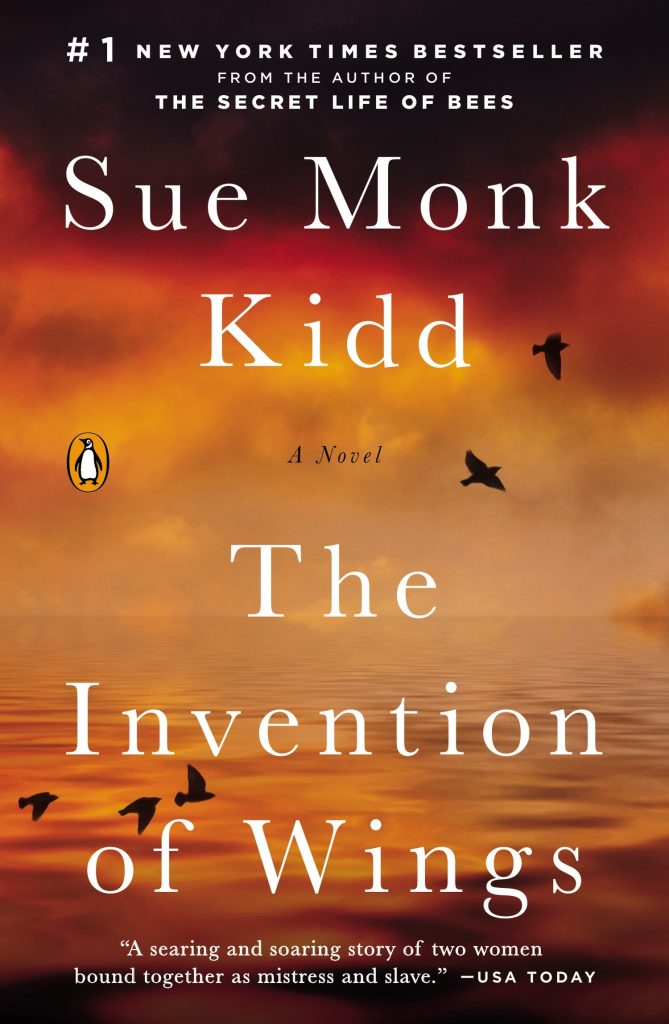The Invention of Wings
 Published by: Penguin Publishing Group
Published by: Penguin Publishing GroupPages: 384
ISBN13: 978-0143121701
Buy the Book: Amazon, Apple Books, Barnes & Noble, Books-A-Million, IndieBound, Bookshop.org, Google Play
Overview
• Published by Viking, January 7, 2014
• Selected for Oprah’s Book Club 2.0
• A New York Times #1 Bestseller
From the celebrated author of The Secret Life of Bees: a masterpiece of hope, daring, the quest for freedom, and the desire to have a voice in the world.
Hetty “Handful” Grimke, an urban slave in early nineteenth century Charleston, yearns for life beyond the suffocating walls that enclose her within the wealthy Grimke household. The Grimkes’ daughter, Sarah, has known from an early age she is meant to do something large in the world, but she is hemmed in by the limits imposed on women.
Sue Monk Kidd’s sweeping new novel is set in motion on Sarah’s eleventh birthday in 1803, when she is given ownership of ten-year-old Handful, who is to be her waiting maid. We follow their remarkable journeys over the next thirty-five years, as both strive for a life of their own, dramatically shaping each other’s destinies and forming a complex relationship marked by guilt, defiance, estrangement, and the uneasy ways of love.
As the stories build to a riveting climax, Handful will endure loss and sorrow, finding courage and a sense of self in the process. Sarah will experience crushed hopes, betrayal, unrequited love, and ostracism before leaving Charleston to find her place alongside her fearless younger sister, Angelina, as one of the early pioneers in the abolition and women’s rights movements.
Inspired in part by the historical figure of Sarah Grimke, Kidd goes beyond the record to flesh out the rich interior lives of all of her characters, both real and invented, including Handful’s cunning mother, Charlotte, who courts danger in search for something better, and Charlotte’s lover, Denmark Vesey, a charismatic free black man who is planning insurrection.
This exquisitely written novel is a triumph of storytelling that looks with unswerving eyes at one of the most devastating wounds in American history, through women whose struggles for liberation, empowerment, and expression will leave no reader unmoved.
Reading Groups
Introduction to The Invention of Wings
About Sue Monk Kidd
A Conversation with Sue Monk Kidd
Discussion Questions
Praise
"Here’s what makes The Invention of Wings extraordinary: Sue Monk Kidd has written a conversation changer. It is impossible to read this book and not come away thinking differently about our status as women and about all the unsung heroines who played a role in getting us to where we are... A tour de force.”
—Oprah Winfrey, O The Oprah Magazine
"The novel is a textured masterpiece, quietly yet powerfully poking our consciences and our consciousness. What does it mean to be a sister, a friend, a woman, an outcast, a slave? How do we use our talents to better ourselves and our world? How do we give voice to our power, or learn to empower our voice?... Kidd, an exquisite and masterful writer, explores these difficult topics and complex ideas and does so unflinchingly — yet somehow leaves us feeling uplifted and hopeful."
—NPR Books
“Masterly... The Invention of Wings is a story about empowering women to change the world... With historical bedrock as her foundation for a compelling narrative, Kidd serves up a remarkable novel about finding your voice.”
—Chicago Tribune
Excerpt
Hetty Handful Grimké
There was a time in Africa the people could fly. Mauma told me this one night when I was ten years old. She said, “Handful, your granny- mauma saw it for herself. She say they flew over trees and clouds. She say they flew like blackbirds. When we came here, we left that magic behind.”
My mauma was shrewd. She didn’t get any reading and writing like me. Everything she knew came from living on the scarce side of mercy. She looked at my face, how it flowed with sorrow and doubt, and she said, “You don’t believe me? Where you think these shoulder blades of yours come from, girl?”
Those skinny bones stuck out from my back like nubs. She patted them and said, “This all what left of your wings. They nothing but these flat bones now, but one day you gon get ’em back.”
I was shrewd like mauma. Even at ten I knew this story about people flying was pure malarkey. We weren’t some special people who lost our magic. We were slave people, and we weren’t going anywhere. It was later I saw what she meant. We could fly all right, but it wasn’t any magic to it.